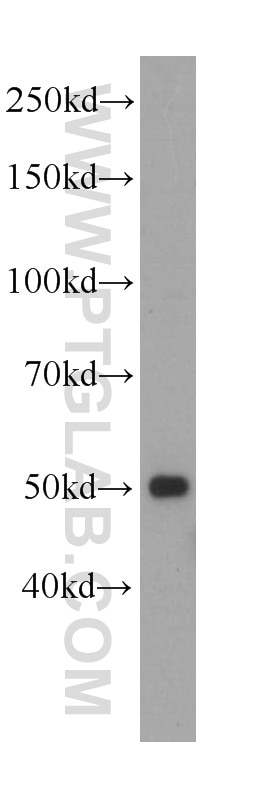PAX1-Specific Monoclonal antibody
PAX1-Specific Monoclonal Antibody for WB,ELISA
Host / Isotype
Mouse / IgG2b
Reactivity
human, mouse
Applications
WB, IF, ELISA
Conjugate
Unconjugated
CloneNo.
5A10D9
Cat no : 60217-1-Ig
Synonyms
Validation Data Gallery
Tested Applications
| Positive WB detected in | K-562 cells |
Recommended dilution
| Application | Dilution |
|---|---|
| Western Blot (WB) | WB : 1:500-1:2000 |
| Sample-dependent, check data in validation data gallery | |
Published Applications
| IF | See 1 publications below |
Product Information
60217-1-Ig targets PAX1-Specific in WB, IF, ELISA applications and shows reactivity with human, mouse samples.
| Tested Reactivity | human, mouse |
| Cited Reactivity | mouse |
| Host / Isotype | Mouse / IgG2b |
| Class | Monoclonal |
| Type | Antibody |
| Immunogen | Peptide 相同性解析による交差性が予測される生物種 |
| Full Name | paired box 1 |
| Calculated molecular weight | 55 kDa |
| Observed molecular weight | 45 kDa |
| GenBank accession number | NM_006192 |
| Gene symbol | PAX1 |
| Gene ID (NCBI) | 5075 |
| RRID | AB_11183763 |
| Conjugate | Unconjugated |
| Form | Liquid |
| Purification Method | Protein A purification |
| Storage Buffer | PBS with 0.02% sodium azide and 50% glycerol pH 7.3. |
| Storage Conditions | Store at -20°C. Stable for one year after shipment. Aliquoting is unnecessary for -20oC storage. |
Background Information
PAX1, also named as HUP48, is a transcriptional activator. It may play a role in the formation of segmented structures of the embryo and may play an important role in the normal development of the vertebral column. It is a marker of the sclerotomal compartment. PAX1 was reported that, quantitative measurement of PAX1 hyper-methylation in cervical scrapings is highly sensitive and is more specific than HC2 in detection of cervical cancer. It is expressed by vSMC and pericytes during the earliest phases of vascular wall formation. This antibody is specific to PAX1.
Protocols
| Product Specific Protocols | |
|---|---|
| WB protocol for PAX1-Specific antibody 60217-1-Ig | Download protocol |
| Standard Protocols | |
|---|---|
| Click here to view our Standard Protocols |
Publications
| Species | Application | Title |
|---|---|---|


